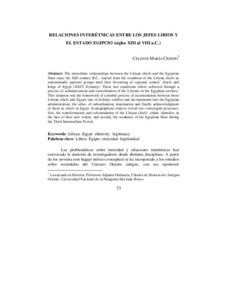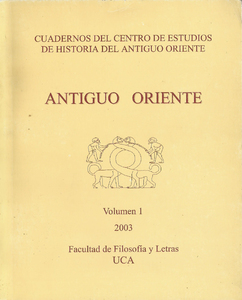Please use this identifier to cite or link to this item:
https://repositorio.uca.edu.ar/handle/123456789/11776| Título: | Relaciones interétnicas entre los jefes libios y el estado egipcio (siglos XIII al VIII a.C.) The interethnic relationships between the libyan chiefs and the Egyptian State since the XIII century B.C. |
Autor: | Crespo, Celeste María | Palabras clave: | LEGITIMIDAD; ETNICIDAD; RELACIONES INTERPERSONALES; ESTADO; HISTORIA DE EGIPTO | Fecha de publicación: | 2003 | Editorial: | Universidad Católica Argentina. Facultad de Ciencias Sociales. Departamento de Historia. Centro de Estudios de Historia del Antiguo Oriente | Cita: | Crespo, C. M. Relaciones interétnicas entre los jefes libios y el estado egipcio (siglos XIII al VIII a.C.) [en línea]. Antiguo Oriente: Cuadernos del Centro de Estudios de Historia del Antiguo Oriente. 2003, 1. Disponible en: https://repositorio.uca.edu.ar/handle/123456789/11776 | Resumen: | Abstract: The interethnic relationships between the Libyan chiefs and the Egyptian
State since the XIII century B.C., started from the condition of the Libyan chiefs as
seminomadic pastoral groups until their becoming of regional centers’ chiefs and
kings of Egypt (XXIV Dynasty). These last conditions where achieved through a
process of sedentarization and consolidation of the Libyans in the Egyptian territory.
This situation was the framework of a double process of accomodation between those
Libyan chiefs and Egypt: one of military conflict and incorporation into the Egyptian
administration; the other, of subordination, domination and finally acknowledgment
of them as chiefs in Egypt. Iconographical sources reveal two convergent processes:
first, the transformation and reformulation of the Libyan chiefs’ ethnic identities in
the face of their new reality; and second, the weakness of the Egyptian State during
the Third Intermediate Period. Resumen: Las problemáticas sobre etnicidad y relaciones interétnicas han convocado la atención de investigadores desde distintas disciplinas. A partir de los noventa este bagaje teórico conceptual se ha incorporado a los estudios sobre sociedades del Cercano Oriente antiguo, con sus oportunos cuestionamientos y reformulaciones teóricas. Este diálogo y cruce de perspectivas entre las ciencias sociales enriqueció no sólo las interpretaciones sobre las sociedades pasadas sino que aportó a la discusión –desde el estudio de caso- de los modelos explicativos vigentes. Considero que el principal aporte de este tipo de investigaciones a nuestro presente es la puesta en escena de la diversidad de formas y lógicas de accionar que existieron y cuyo legado consiste, no sólo en su cultura material de museo, sino en formularnos que hay otros mundos alternativos a los que pretenden hegemonizar y dominar en todos los tiempos. El registro histórico y etnográfico es mucho más complejo y desconocido que la pretendida arrolladora fuerza de esos modelos hegemónicos, como la actual globalización y en aquellos tiempos lejanos, los estados imperiales antiguos. |
URI: | https://repositorio.uca.edu.ar/handle/123456789/11776 | ISSN: | 1667-9202 | Disciplina: | HISTORIA | Derechos: | Acceso abierto | Fuente: | Antiguo Oriente: Cuadernos del Centro de Estudios de Historia del Antiguo Oriente 2003, 1 |
| Appears in Collections: | AO - 2003 nro.1 |
Files in This Item:
| File | Description | Size | Format | |
|---|---|---|---|---|
| relaciones-interetnicas-jefes-libios.pdf | 114,63 kB | Adobe PDF |  View/Open | |
| antiguo-oriente-vol. 1.jpg | 1,19 MB | JPEG |  View/Open |
Page view(s)
140
checked on Apr 30, 2024
Download(s)
158
checked on Apr 30, 2024
Google ScholarTM
Check
This item is licensed under a Creative Commons License

